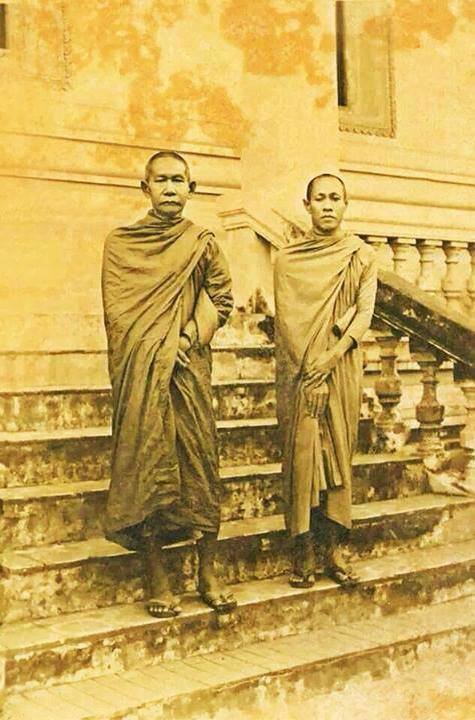| Title | Supreme Patriarch of Cambodia |
|---|---|
| Personal | |
| Born | 1 February 1893 Oudong, Cambodia |
| Died | 1975 |
| Religion | Buddhism |
| Nationality | Cambodian |
| School | Theravada |
| Lineage | Maha Nikaya |
| Senior posting | |
| Predecessor | Chuon Nath |
| Successor | Tep Vong |
Samdech Preah Mahā Somethea Dhipati Hout Tat (Khmer: ហួត តាត, 1 February 1893 – 1975), Dharma name: Vajirapañño, was the fifth Supreme Patriarch of the Maha Nikaya order of Cambodia.
Hout Tat was born in Oudong District, Kampong Speu Province. He joined the monkhood when he was 13. In 1969, he succeeded Chuon Nath as the new Supreme Patriarch of the Maha Nikaya order upon the latter's death.[1]
On 17 April 1975, immediately after the Khmer Rouge's march into Phnom Penh, Hout Tat and all the Buddhist monks were ordered to leave the city. The next day, he was taken to Oudong, where he was insulted and beaten. He was executed at the Prang pagoda in Oudong district.[2] His statue was later thrown into the Mekong River.[3]
Samdech Chuon Nath ជួន ណាត Chuon Nath Som Dech Nath was the head of a reformist movement in the Khmer Buddhist Sangha which developed a rationalist-scholasti. The son of Khmer farmers in Kampong Speu, Chuon Nath grew up to become a Buddhist monk, an author, a composer, a poet and the head of a Khmer Buddhist reformist movement, the Dhammayuttika Nikaya. Chuon Nath: His Holiness Samdech Chuon Nath. World Heritage Encyclopedia, the aggregation of the largest online encyclopedias available, and the.
Khmer (Cambodian) Dictionaries such as Khmer-Khmer (Chuon Nath), Khmer-English, and English-Khmer. Electronic Khmer to Khmer Chuon Nath Dictionary. Chuon Nath’s Dictionary is one of the finest works in the Khmer language. Khmer dictionary running on Windows and Mac.

During the Khmer Rouge genocide, more than 25,000 monks were executed. 1,968 Buddhist buildings, including temples and monasteries, were destroyed.[4]
References[edit]
- ^Yathay, Pin (2013-05-21). Stay Alive, My Son. Cornell University Press. ISBN9780801468650.
- ^Pot, Pol; Sary, Ieng; révolutionnaire, Cambodia Tribunal populaire (2000-04-04). Genocide in Cambodia: Documents from the Trial of Pol Pot and Ieng Sary. University of Pennsylvania Press. p. 361. ISBN9780812235395.
- ^Temples (wats) of Phnom Penh
- ^'Culture : Buddhism Rising Again From the Ashes of Cambodia : The Khmer Rouge used genocide to try to eradicate the religion. Its comeback is slow but steady'. Los Angeles Times. 19 June 1990.

Som Dech Nath was the head of a reformist movement in the Khmer Buddhist Sangha which developed a rationalist-scholastic model of Buddhism, rooted in linguistic studies of the Pali Canon. This new movement, known as Dhammayuttika Nikaya, influenced young Khmer monks in the early 20th century.[1] The new movement also cultivated Khmer-language identity and culture, giving rise to the notion of Cambodian nationalism.

Nath pushed for a series of innovations in the Khmer Sangha beginning in the early twentieth century: the use of print for sacred texts (rather than traditional methods of hand-inscribing palm-leaf manuscripts); a higher degree of expertise in Pali and Sanskrit studies among monks; a vision of orthodoxy based on teaching of Vinaya texts for both monks and lay-people; and modernization of teaching methods for Buddhist studies.
He also oversaw the translation of the entire Buddhist Pali canon into Khmer language; and the creation of the first modern Khmer language dictionary.
The French set up its protectorate over Cambodia and intended to replace the Khmer language with its own through the so-called 'pseudo-French intellectuals.' This intention rallied many Cambodian scholars to the course of conserving the Khmer language; one such scholar was Nath. A son of farmers who later became a monk, Nath dedicated his life to upholding Buddhism and the conservation of Khmer language in the country that was highly influenced by French colonialism. He had an extensive knowledge of the Khmer language. He was probably the most famous and most knowledgeable monk Cambodia had ever had. A master in Buddha’s teaching, he was very well known around the Buddhism circle as well as very adept at languages. Throughout his life he encouraged the use of 'Khmerization' in both public education and religions. What Nath meant by 'Khmerization' was he wanted to derive new Khmer words from its ancestral roots, the Pali and Sanskrit languages. For example, when the train arrived first in Cambodia, there was no Khmer word for the train. Nath thus derived the word for train from Sanskrit and Pali word of Ayomoyo
 which means something that is made of metal. Together with the word Yana which means vehicle, came the Khmer word for train which we know today as Ayaksmeyana, pronounced Ayak-smey-yean.
which means something that is made of metal. Together with the word Yana which means vehicle, came the Khmer word for train which we know today as Ayaksmeyana, pronounced Ayak-smey-yean.However, Nath’s Khmerization was not overall accepted by all Khmers. Scholars such as Keng Vannsak who were pro-French did not find the kind of Khmer words derived from Pali and Sanskrit to be convenient. They revolutionized another kind of derivation which they want to adopt normalized French word into Khmer vocabulary. The only major change was to use Khmer alphabet to write the word rather than using the Roman alphabets used by the French. But despite opposition, Nath’s Khmerization succeeded. He was a member of the original committee granted royal order to compile a Khmer dictionary in 1915 and was credited as the founder of the dictionary as he pushed for and finally succeeded in printing the first edition of the current Khmer dictionary in 1938. In 1967, he was elevated to the rank of doctor.
Nath’s other contribution to Cambodia include the current national anthem, Nokor Reach, for which he composed both music and lyrics.Nokor Reach was written to correspond to the motto of the nation, 'Nation, Religion, King' as well as demonstrate the grandeur and the mighty past of the Khmer nation.
Khmer Dictionary Chuonath

Dictionary Chuon Nath
